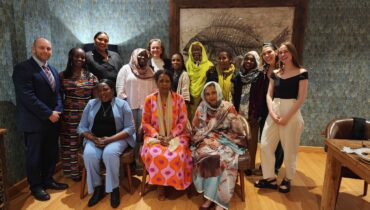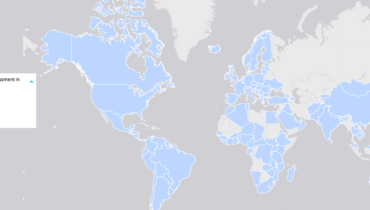By Amb. Melanne Verveer and Zainab Hawa Bangura. Originally posted in The Guardian here.
With each passing day, there is another story about the horrific violence Islamic State is perpetrating against women and girls. ISIS fighters reportedly raped four women, then stoned them to death in February for “committing adultery”. Iraqi forces recently found a mass gravecontaining the bodies of women and children believed murdered by ISIS. And in 2014, ISIS massacred an estimated 5,000 civilians on Mount Sinjar in Iraq, causing hundreds of people to flee and condemning hundreds of Yazidi women to sexual slavery.
The stories from women who have escaped ISIS reveal extreme brutality. Journalists and human rights organizations reveal the severity of these atrocities, including sexual slavery, forced marriage, kidnapping and rape.
Though each conflict is unique, we have seen time and again that sexual violence is a systematic and strategic tool of war – not simply an inevitable consequence.
Extremist groups such as ISIS and Boko Haram use sexual violence because it disrupts and further destabilizes families and communities, and stigmatizes women. The abuses ISIS perpetrates are being justified in the name of religion sanctioned by references to the Qur’an, based on their radical interpretations. This form of violence has distinct and devastating consequences that remain with individuals, communities and countries across generations.
“If we are to counter extremism, particularly the use of sexual violence, we cannot afford to separate the acts of violence in conflict from larger systems that objectify and subjugate women during conflict and peace.”
To counter violent extremism, we need to understand how sexual violence – and violence against women more broadly – is a cornerstone of ISIS’s drive to build a caliphate.
This violence is coupled with a governing philosophy that seeks to roll back women’s rights in all forms. ISIS forces women into sexual slavery to satisfy the demands of fighters, keep them committed, and to produce offspring. It trafficks humans to generate income, selling women and girls to local buyers and through international circuits.
If we are to counter extremism, particularly the use of sexual violence, we cannot afford to separate the acts of violence in conflict from larger systems that objectify and subjugate women during conflict and peace.
Addressing sexual violence is a necessity to protect human rights and ensure peace and security. Perpetrators need to be held accountable. Peace agreements that address the impacts of sexual violence stand a better chance of promoting social cohesion, economic recovery and sustainable peace.
Here are some steps we believe should be taken immediately to address conflict-related sexual violence.
First, the international community must place a high priority on ensuring the full implementation of the existing laws and commitments that advance women’s protection and empowerment. UN security council resolution 1325 – which acknowledged the disparate impact of conflict on women and girls, and affirmed the participation and representation of women in conflict resolution and post-conflict recovery – has not been fully implemented. In responding to violent extremism, decision-making – from government policies to counterterrorism strategies and humanitarian responses – can undermine a key strategy of extremist organisations by focusing on women.
Second, it is critical to dismantle the culture of impunity surrounding conflict-related sexual violence, with a strong focus on bringing those responsible to justice. This requires thorough documentation and investigation of cases, and an insistence that we cannot allow perpetrators to receive haven or amnesty for their crimes. All parties to conflict, both state and non-state actors, have an obligation under international law to both prevent and punish crimes of sexual violence in conflict.
Addressing impunity also requires governments to provide reparations. Justice is not just about punishing perpetrators; it is about empowering survivors. Reparations shared robustly link economic empowerment, dignity and social change, allowing survivors to return to normal lives.
We have seen progress in the Democratic Republic of the Congo, when in 2014 the government took an unprecedented step to prosecute high-ranking army officers and pay reparations to survivors. In Colombia, the peace and justice tribunal ordered paramilitary leaders to provide reparations for more than 9,500 people, including victims of conflict-related sexual violence, and to publicly apologise. And in a landmark ruling, Bosnian courts recently decided on financial compensation as a form of reparations for survivors of rape and sexual violence during the war in the 1990s.
“A focus on human rights, development and gender equality must be integral to this approach. Nothing less will serve to counter violent extremism and the threat it represents.”
Third, holistic services for survivors and their families – including psychological services, physical care and psychosocial treatment – must be prioritized and made available in any coordinated humanitarian response. We must work to remove the stigma that so many survivors of sexual violence face so that they can be safely reintegrated into their homes and communities. Comprehensive care requires adequate funding that can help families and communities heal and move forward.
Finally, we must place a premium on protecting human rights and ensuring full and meaningful participation in peace-building, security operations, the economy and decision-making. This gets to the root cause of violence against women: unequal status in society and the resulting objectification. Counterterrorism strategies and humanitarian responses must place women’s empowerment at the forefront. They should be seen not solely as victims, but as leaders and change-makers.
If we are serious about countering extremism and addressing the gross human rights violations being committed by groups like ISIS, a comprehensive, coordinated approach – which engages not only governments and military forces, but also religious leaders, community groups and women’s organisations – is required. Moreover, a focus on human rights, development and gender equality must be integral to this approach. Nothing less will serve to counter violent extremism and the threat it represents.
About the Author
Ambassador Melanne Verveer is the Executive Director of the Georgetown Institute for Women, Peace and Security, and former Ambassador-at-Large for Global Women’s Issues at the U.S. Department of State.


